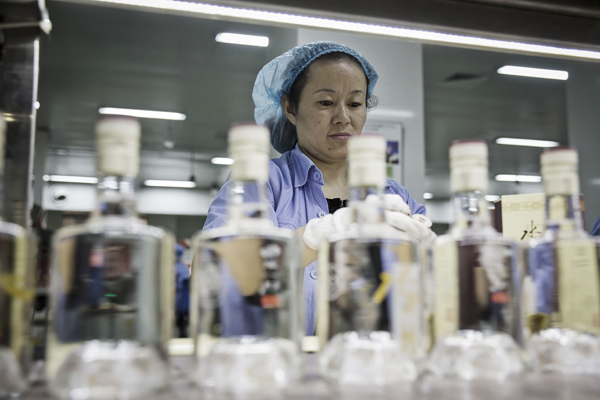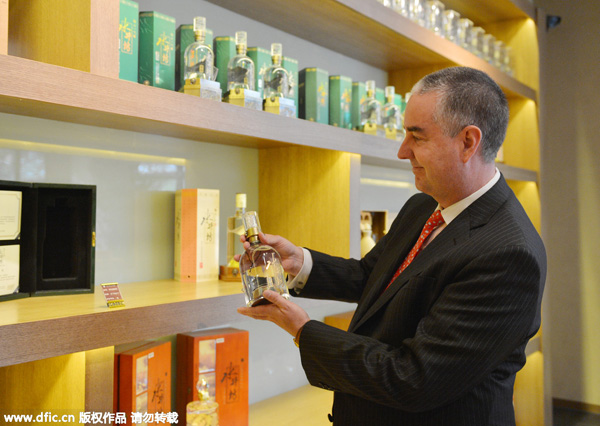 |
|
A worker packs bottles of Shuijingfang baijiu into boxes at the Yongxing distillery operated by Sichuan Swellfun Co, a unit of Diageo Plc, in Chengdu, China, on Sept 20, 2016. [Photo/Bloomberg] |
The fiery Chinese grain liquor called baijiu has been distilled and quaffed in the homeland pretty much the same way for a millennium. Yet, as these brands expand overseas, spirits companies are wondering: How would it taste with 7-Up?
Makers of the 106-proof alcohol that's popular at wedding receptions and government banquets are coping with a steep revenue drop after the Chinese government ordered public servants to cut their expense tabs. Sales declined 13 percent, and store prices plunged by half.
With less than 1 percent of baijiu consumed abroad, Chinese distillers now want to transform the liquor into "the new tequila" for Americans and Europeans. So they're diluting its stomach-burning potency, hiring mixologists to experiment with ginseng and tropical fruits, and promoting the concoctions at bars in New York, London, Sydney-even at Walt Disney World.
"We want to see baijiu have its moment in the world," said Tony Tian, commercial director of Diageo Plc's China White Spirits unit, which includes the high-end Shuijingfang brand. "Tequila had it, vodka had it. Why not baijiu?"
Venerable brands like Shuijingfang, less-expensive offerings such as Beijing Red Star Co and startups such as ByeJoe and HKB are searching for the right ingredients that will do for baijiu what the margarita did for tequila. They're trying grapefruit juice, Angostura bitters and brown sugar to mask a pungency considered on par with the durian fruit popular in Southeast Asia.
They're also lowering the liquor's alcohol content to make it more akin to the 80-proof spirits favored by Westerners, infusing bottles with flavorings and promoting the antioxidant powers of the main ingredient sorghum. The makers have nothing to lose and everything to gain, since exports made up just 0.1 percent of baijiu sales last year, according to statistics from London-based International Wine and Spirit Research.
"Baijiu is not a spirit you can just pour into a martini glass and grow an appreciation for its taste immediately," said Orson Salicetti, co-founder of the Lumos bar in New York that serves about 40 different brands. "The trick to appreciating baijiu is embracing its unfamiliar flavor in cocktails."
Varieties of baijiu, or "white liquor," are made from sorghum, rice, wheat or corn, and can contain as much as 53 percent alcohol by volume. About 5.5 billion liters, or 1.5 billion gallons, were sold last year, according to London-based Euromonitor International.
Industry revenue last year was 766 billion yuan ($115 billion), compared with a peak of 882 billion yuan in 2012, when consumers were propping up demand and prices for top-shelf brands like Shuijingfang and Kweichow Moutai by gifting bottles. The government's edict ended that party.
"Baijiu must change, transform and explore," said Song Shuyu, director of the China Alcoholic Drinks Association, a government oversight and promotion body.
Baijiu traditionally is imbibed in extra-small shot glasses during big, celebratory meals. At least in China.
At nightspots abroad, Diageo advises bartenders to mix Shuijingfang, the brand it bought in 2011, with 7-Up to make it more palatable to non-Chinese. The world's largest distiller, based in London, also created a recipe-similar to an Old Fashioned-it will promote in 50 Hong Kong bars by year's end.
 |
|
General manager of Shui Jing Fang James Michael Rice at old brewery of Shuijingfang, Chengdu, Sichuan province, June 5, 2013. [Photo/IC] |
"We want to introduce our baijiu to Western drinkers slowly," Tian said. "We want people to first try it in the context of a cocktail. They may be intrigued by it and then slowly move up to the real version."
Shuijingfang has produced baijiu in Chengdu, southwest China, for 600 years. The distillery smells like strong blue cheese as grains ferment in rectangular pits. Workers follow enduring instructions dictating the direction in which grains are spread and the tempo with which the water is stirred.
After fermentation, baijiu is poured into urns that can sit for 35 years. A master blender mixes liquid from several urns before it's poured into an iconic Shuijingfang bottle-a bottom-heavy, intricately etched glass meant to be the centerpiece of a banquet table.
Other old-school distillers like Beijing Red Star, which traces its lineage to 1680, are trying to keep pace with new varieties. It's introducing Nuwa, which has 42 percent alcohol and comes in a grooved bottle for easy handling by harried bartenders.
And just like other industries, an adherence to tradition can create gaps where innovation germinates. Startups are developing cheaper, less-potent products with names like HKB and Byejoe, and using slick advertisements targeting 20-somethings.
The newcomers, founded by Westerners who lived in China or have Chinese heritage, are found in trendy nightspots in New York and London, and in mainstream vacation spots like Disney World.
HKB founder Charles Lanthier, who lived in Shanghai for four years while working in the finance industry, sources his baijiu from China and re-distills it in Italy. Backers of HKB, or Hong-Kong Baijiu, include the French investment fund Weber Investissements.
About 100 locations in New York use it in cocktails, he said.
"You can bring the heritage, but you also need to adapt to a certain consumption mode," Lanthier said. "Tequila in the US is not drunk the same way it was drunk in Mexico 20 years ago."
Matt Trusch, whose dragon fruit- and lychee-infused baijiu is served at two Disney World bars in Florida, started Byejoe after living in Shanghai for 12 years. Backers include former NBA star Yao Ming's investment team, and Trusch said the company is profitable after four years.
"What we've done that the baijiu companies didn't manage to do is create a product for the young consumer," Trusch said. "There's a demand in the market that's not filled."
Byejoe's website includes a recipe using Starbucks frappuccino, Frangelico, creme de cacao and Bittermens orange cream citrate. There also are commercials featuring Byejoe drinkers at a hip nightspot.
A place just like that is Lumos, where bottles of HKB, Kweichow Moutai and Wuliangye line the shelves. Lumos serves a Sesame Colada-baijiu mixed with mangosteen, white sesame paste, caramelized pineapple and agave.
Salicetti and partner Qifan Li opened the bar in June 2015, and now Salicetti teaches classes on mixing baijiu with prune, basil and fig.
"It's an evolution," he said. "We introduce cocktails in a fun way." Down the bar, Kayla Deaton agreed. The 27-year-old, who works in finance, learned about baijiu while studying in Shanghai.
"I always sipped it and had the shot in China, but I actually prefer it in a cocktail," she said. "It's better if you add a little sugar."
